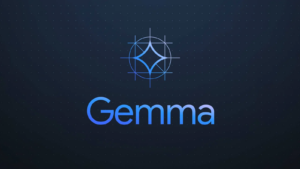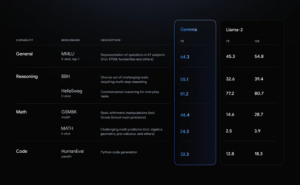
Google Announces Gemma: A New Family of Open AI Models Inspired by Gemini
Feb. 22, 2024 — Google is excited to introduce Gemma, a new generation of open models to assist developers and researchers in building AI responsibly. Gemma is a family of lightweight, state-of-the-art open models built from the same research and technology used to create the Gemini models.
 Developed by Google DeepMind and other teams across Google, Gemma is inspired by Gemini, and the name reflects the Latin gemma, meaning “precious stone.” Accompanying the model weights, Google is also releasing tools to support developer innovation, foster collaboration, and guide responsible use of Gemma models.
Developed by Google DeepMind and other teams across Google, Gemma is inspired by Gemini, and the name reflects the Latin gemma, meaning “precious stone.” Accompanying the model weights, Google is also releasing tools to support developer innovation, foster collaboration, and guide responsible use of Gemma models.
Gemma is available worldwide. Here are the key details to know:
- Google is releasing model weights in two sizes: Gemma 2B and Gemma 7B. Each size is released with pre-trained and instruction-tuned variants.
- A new Responsible Generative AI Toolkit provides guidance and essential tools for creating safer AI applications with Gemma.
- Google is providing toolchains for inference and supervised fine-tuning (SFT) across all major frameworks: JAX, PyTorch, and TensorFlow through native Keras 3.0.
- Ready-to-use Colab and Kaggle notebooks, alongside integration with popular tools such as Hugging Face, MaxText, NVIDIA NeMo and TensorRT-LLM, make it easy to get started with Gemma.
- Pre-trained and instruction-tuned Gemma models can run on laptops, workstations, or Google Cloud with easy deployment on Vertex AI and Google Kubernetes Engine (GKE).
- Optimization across multiple AI hardware platforms ensures industry-leading performance, including NVIDIA GPUs and Google Cloud TPUs.
- Terms of use permit responsible commercial usage and distribution for all organizations, regardless of size.
Gemma models share technical and infrastructure components with Gemini, Google’s largest and most capable AI model widely available today. This enables Gemma 2B and 7B to achieve best-in-class performance for their sizes compared to other open models. And Gemma models are capable of running directly on a developer laptop or desktop computer. Notably, Gemma surpasses significantly larger models on key benchmarks while adhering to rigorous standards for safe and responsible outputs. See the technical report for details on performance, dataset composition, and modeling methodologies.
Responsible by Design
Gemma is designed with Google’s AI Principles at the forefront. As part of making Gemma pre-trained models safe and reliable, Google used automated techniques to filter out certain personal information and other sensitive data from training sets. Additionally, Google used extensive fine-tuning and reinforcement learning from human feedback (RLHF) to align instruction-tuned models with responsible behaviors.
To understand and reduce the risk profile for Gemma models, Google conducted robust evaluations including manual red-teaming, automated adversarial testing, and assessments of model capabilities for dangerous activities. These evaluations are outlined in the Model Card.
Google is also releasing a new Responsible Generative AI Toolkit together with Gemma to help developers and researchers prioritize building safe and responsible AI applications. The toolkit includes:
- Safety classification: Google provides a novel methodology for building robust safety classifiers with minimal examples.
- Debugging: A model debugging tool helps you investigate Gemma’s behavior and address potential issues.
- Guidance: You can access best practices for model builders based on Google’s experience in developing and deploying large language models.
Optimized Across Frameworks, Tools And Hardware
You can fine-tune Gemma models on your own data to adapt to specific application needs, such as summarization or retrieval-augmented generation (RAG). Gemma supports a wide variety of tools and systems:
- Multi-framework tools: Bring your favorite framework, with reference implementations for inference and fine-tuning across multi-framework Keras 3.0, native PyTorch, JAX, and Hugging Face Transformers.
- Cross-device compatibility: Gemma models run across popular device types, including laptop, desktop, IoT, mobile and cloud, enabling broadly accessible AI capabilities.
- Cutting-edge hardware platforms: Google has partnered with NVIDIA to optimize Gemma for NVIDIA GPUs, from data center to the cloud to local RTX AI PCs, ensuring industry-leading performance and integration with cutting-edge technology.
- Optimized for Google Cloud: Vertex AI provides a broad MLOps toolset with a range of tuning options and one-click deployment using built-in inference optimizations. Advanced customization is available with fully-managed Vertex AI tools or with self-managed GKE, including deployment to cost-efficient infrastructure across GPU, TPU, and CPU from either platform.
Free Credits for Research and Development
Gemma is built for the open community of developers and researchers powering AI innovation. You can start working with Gemma today using free access in Kaggle, a free tier for Colab notebooks, and $300 in credits for first-time Google Cloud users. Researchers can also apply for Google Cloud credits of up to $500,000 to accelerate their projects.
Getting Started
You can explore more about Gemma and access quickstart guides on ai.google.dev/gemma.
Source: Jeanine Banks and Tris Warkentin, Google




























